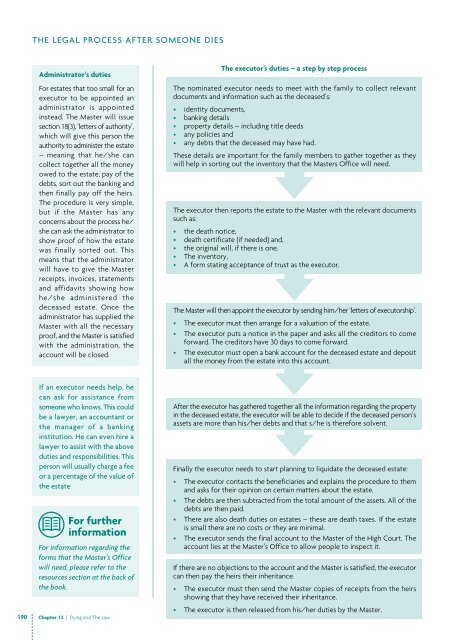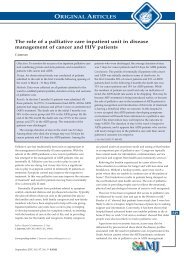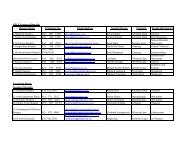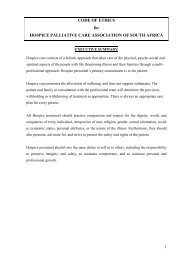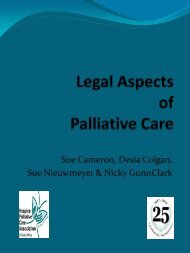Dying and The Law - Hospice Palliative Care Association of South ...
Dying and The Law - Hospice Palliative Care Association of South ...
Dying and The Law - Hospice Palliative Care Association of South ...
Create successful ePaper yourself
Turn your PDF publications into a flip-book with our unique Google optimized e-Paper software.
THE LEGAL PROCESS AFTER SOMEONE DIESAdministrator's dutiesFor estates that too small for anexecutor to be appointed anadministrator is appointedinstead. <strong>The</strong> Master will issuesection 18(3), ‘letters <strong>of</strong> authority’,which will give this person theauthority to administer the estate– meaning that he/she cancollect together all the moneyowed to the estate, pay <strong>of</strong> thedebts, sort out the banking <strong>and</strong>then finally pay <strong>of</strong>f the heirs.<strong>The</strong> procedure is very simple,but if the Master has anyconcerns about the process he/she can ask the administrator toshow pro<strong>of</strong> <strong>of</strong> how the estatewas finally sorted out. Thismeans that the administratorwill have to give the Masterreceipts, invoices, statements<strong>and</strong> affidavits showing howhe/she administered thedeceased estate. Once theadministrator has supplied theMaster with all the necessarypro<strong>of</strong>, <strong>and</strong> the Master is satisfiedwith the administration, theaccount will be closed.<strong>The</strong> executor’s duties – a step by step process<strong>The</strong> nominated executor needs to meet with the family to collect relevantdocuments <strong>and</strong> information such as the deceased’s:• identity documents,• banking details• property details – including title deeds• any policies <strong>and</strong>• any debts that the deceased may have had.<strong>The</strong>se details are important for the family members to gather together as theywill help in sorting out the inventory that the Masters Office will need.<strong>The</strong> executor then reports the estate to the Master with the relevant documentssuch as:• the death notice,• death certificate (if needed) <strong>and</strong>,• the original will, if there is one.• <strong>The</strong> inventory,• A form stating acceptance <strong>of</strong> trust as the executor.<strong>The</strong> Master will then appoint the executor by sending him/her ‘letters <strong>of</strong> executorship’.• <strong>The</strong> executor must then arrange for a valuation <strong>of</strong> the estate.• <strong>The</strong> executor puts a notice in the paper <strong>and</strong> asks all the creditors to comeforward. <strong>The</strong> creditors have 30 days to come forward.• <strong>The</strong> executor must open a bank account for the deceased estate <strong>and</strong> depositall the money from the estate into this account.If an executor needs help, hecan ask for assistance fromsomeone who knows. This couldbe a lawyer, an accountant orthe manager <strong>of</strong> a bankinginstitution. He can even hire alawyer to assist with the aboveduties <strong>and</strong> responsibilities. Thisperson will usually charge a feeor a percentage <strong>of</strong> the value <strong>of</strong>the estateFor furtherinformationFor information regarding theforms that the Master's Officewill need, please refer to theresources section at the back <strong>of</strong>the book.190 Chapter 12 | <strong>Dying</strong> <strong>and</strong> <strong>The</strong> <strong>Law</strong>After the executor has gathered together all the information regarding the propertyin the deceased estate, the executor will be able to decide if the deceased person’sassets are more than his/her debts <strong>and</strong> that s/he is therefore solvent.Finally the executor needs to start planning to liquidate the deceased estate:• <strong>The</strong> executor contacts the beneficiaries <strong>and</strong> explains the procedure to them<strong>and</strong> asks for their opinion on certain matters about the estate.• <strong>The</strong> debts are then subtracted from the total amount <strong>of</strong> the assets. All <strong>of</strong> thedebts are then paid.• <strong>The</strong>re are also death duties on estates – these are death taxes. If the estateis small there are no costs or they are minimal.• <strong>The</strong> executor sends the final account to the Master <strong>of</strong> the High Court. <strong>The</strong>account lies at the Master’s Office to allow people to inspect it.If there are no objections to the account <strong>and</strong> the Master is satisfied, the executorcan then pay the heirs their inheritance.• <strong>The</strong> executor must then send the Master copies <strong>of</strong> receipts from the heirsshowing that they have received their inheritance.• <strong>The</strong> executor is then released from his/her duties by the Master.


